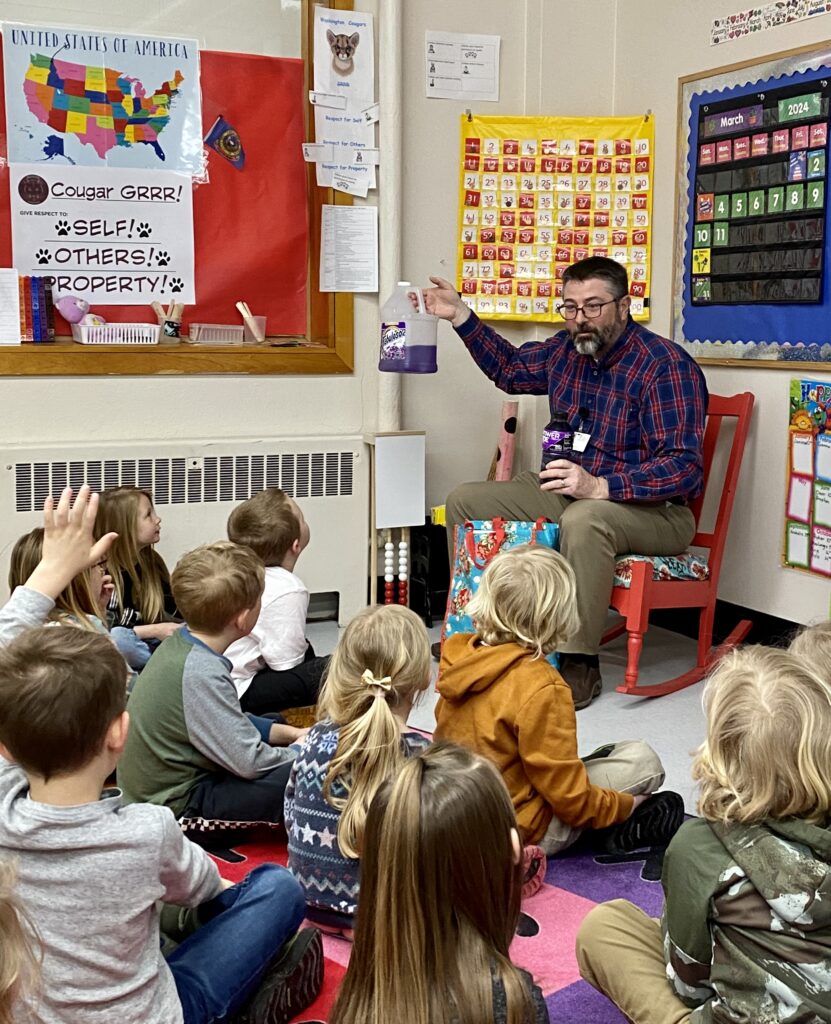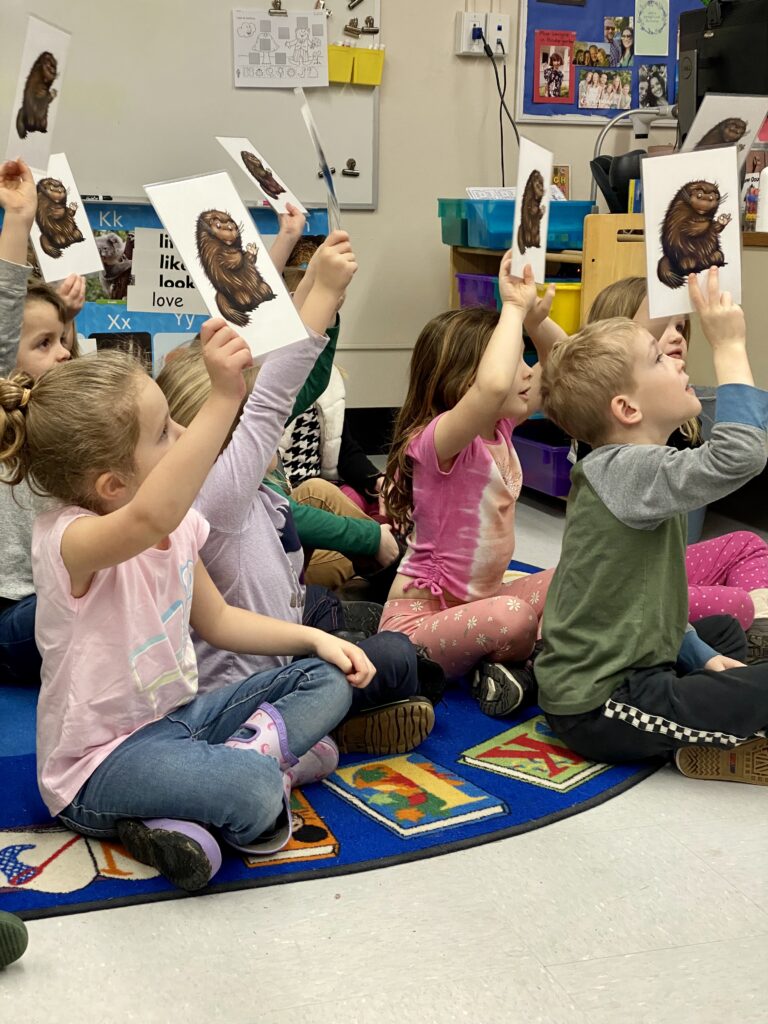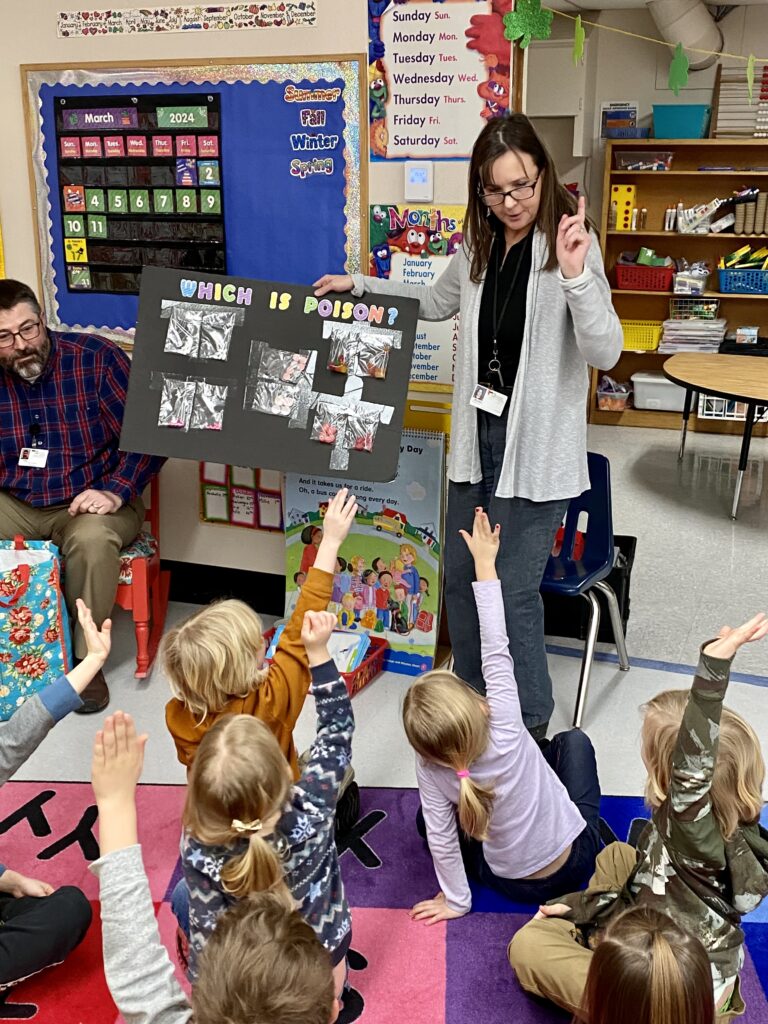By: Kristin Carlson – Bonner General Health
When Mrs. Lavigne’s Kindergarten class at Washington Elementary was asked, “Can anyone tell me what a poison is?” You could see their minds at work. Slowly, a little hand went in the air, “A snake bite?” Soon after, similar responses followed about what is considered poison.
The question served as an icebreaker to a Poison Prevention Community Outreach Program hosted by the Bonner General Health Pharmacy to educate children in grades K-2 about everyday household items that could be dangerous and what to do if they encounter them.

The program is funded by the Bonner General Health Foundation’s Hometown Health Grant Initiative grant.
Bonner General Health Pharmacist Brooke Schaat wrote the grant. In 2021, the National Poison Control Center received 2.08 million phone calls concerning human poison exposures. Of those calls, 81.4% were unintentional exposures concerning children 12 years old and younger. Some of the most common causes of childhood poisoning include prescription medications, cleaning substances, over-the-counter pain medications, vitamins, and antihistamines. “Due to pharmacist’s extensive knowledge not only of medications but also chemical ingredients used in over-the-counter products, household substances, and antidotes, they are in a unique position to provide poison prevention education to the community,” says Schaat. Before this initiative, Lake Pend Oreille School District did not have a poison prevention program for the elementary schools, allowing an opportunity for BGH to increase patient safety and patient education through interactive, engaging lessons in the classroom setting. “This program is not just about educating children; it’s about making our community safer and more aware.”
Activities included comparing the look of a toxic vs. non-toxic item, identifying objects that look like candy but could actually be medication, watching a video featuring Spike the Poison Prevention Porcupine and how to identify dangerous items in your home, and what to do if you don’t know: “Don’t touch, taste or smell” and “Ask an Adult” were some of the messages. The lesson ended with an interactive game where staff held up images and asked the kids to hold up a picture of Spike indicating “Quills Up, Stay Away” or “Quills Down, It’s Okay.” “This active participation of the children is what makes the program truly effective,” Sharla Comstock – Pharmacy Director, Bonner General Health.

Kids were sent home with an interactive coloring sheet, a magnet with the phone number for Poison Control, and “homework” for their parent/guardian, informing them of the day’s lesson and how to keep their home safe. One child concluded, “If my little brother tries to reach poison, I will keep him away!” Lesson learned.
The program is slated to reach over 500 students throughout the school district this winter/spring. While the grant only covers funding for one year, the Pharmacy team is hopeful they will acquire funding to keep the program going for years to come. Washington Elementary Principal Natassia Hamer said she signed up the kindergarten class for the program but “hopes to bring it back for the 1st Graders before the end of the year.”

The Hometown Health Grants Initiative launched in 2021, allowing BGH departments to write grants to the Foundation for items that fall outside of the traditional budget. Grants are reviewed by a committee and awarded based on need, impact, and sustainability. In 2023, the Foundation awarded $50,000 in grants to various hospital departments. For more information, visit bonnergeneral.org.
Poison Help Line: 1‑800‑222‑1222
Bonner General Health is a 25-bed Critical Access Hospital and healthcare network of outpatient clinics in Sandpoint, Idaho, providing comprehensive medical services to patients in Northern Idaho, Eastern Washington, and Western Montana. Through compassion, excellence, integrity, and stewardship, Bonner General Health strives to honor its mission to Improve Health, Inspire Hope, and Save Lives.

